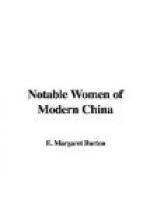The statement of one of her fellow students is impressive: “She had a great influence over the girls, and during our revival seasons she usually led more to Christ than any other girl in the school. One mother, when she came to visit the school after such a meeting during which her own daughter had been converted, exclaimed, ’Little did I think when I was giving money for the work in China, that a Chinese girl would come to this country and be the means of leading my daughter to Christ.’”
Miss Martin tells of one student who had long resisted all appeals, but who would listen to King Eng when she would not hear any one else; and who was finally led by her to such a complete consecration that she afterward gave her life to missionary service in Japan.
During her vacation periods King Eng often addressed missionary meetings with marked success, winning such testimonies as these: “We are thanking God for that grand missionary meeting. It would have done your heart good to have heard the references to it in our Wednesday night prayer meeting,” or, “One gentleman said to me, ’That was the best missionary meeting we ever had in Third Avenue.’” It was probably while doing such work as this that she had the experiences which led her to realize so keenly the blessing of the unbound feet which had caused her so many tribulations as a child, for she says that when she was running for trains in America she always remembered “Those feet,” “Those feet,” and was glad that she had them.
In the summer of 1886 she attended a meeting of the International Missionary Union, and there met Mrs. Baldwin, who had known her as a child in Foochow. Mrs. Baldwin wrote of the impression she made at this time: “Our dear little Chinese girl, Hue King Eng, won all hearts, as usual, by her sweet, gentle, trustful Christian character. To us who have known her from her infancy up, the meeting was of peculiar pleasure; and as she grasped my hand and in low, earnest, glad tones exclaimed in our Foochow dialect, ‘Teacheress, all the same as seeing my own house people,’ I could heartily respond, ‘All the same.’”
At the same time she was making rapid progress in her studies. At the annual meeting of the Woman’s Foreign Missionary Society in 1886, “the marvellous progress of Hue King Eng was reported ... and tears of gladness filled many eyes as her implicit faith, her sturdy industry, and her untiring devotion were described.”
She completed her course in Ohio Wesleyan University in four years, and in the autumn of 1888 entered the Woman’s Medical College of Philadelphia, doing the regular class work, and making her home with her friend Mrs. Keen. After two years of work there, she was very ill with a fever for many weeks. When her strength began to come back, it was decided that she should stop studying for a time and go to China for the following year, as she was very eager to visit her home, especially as her father was ill.




